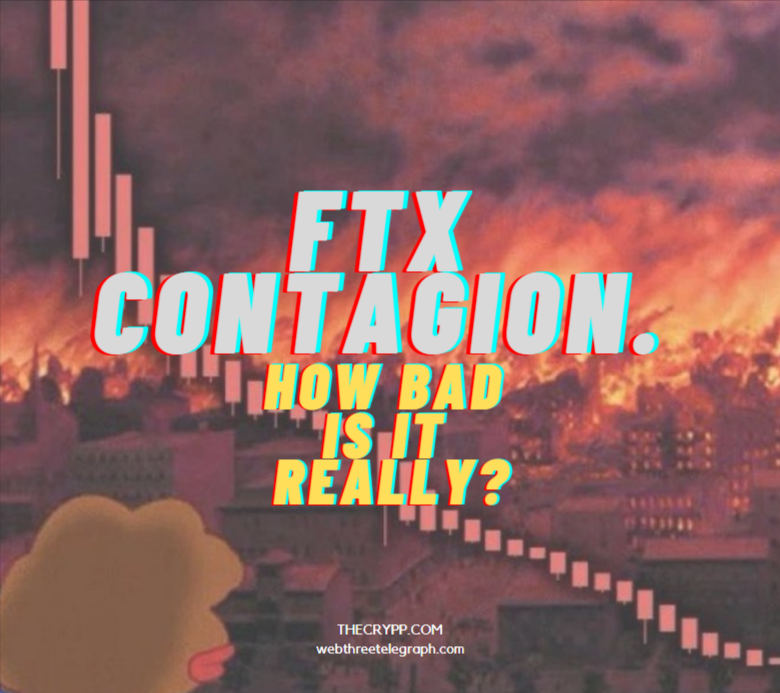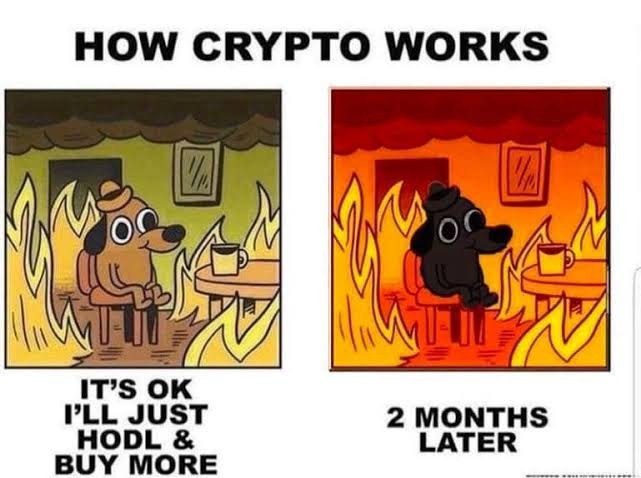FTX's stunning collapse has sent shockwaves through the entire crypto ecosystem.
The aftermath of the once-giant exchange's implosion continues this week as the cryptocurrency market crashes, luring many high-profile backers of the once-bankrupt platform into regulatory talks in Washington, D.C, and behind closed doors to save other companies posing systemic risk like Genesis (DCG).
Exactly how far has the FTX meltdown spread to other major crypto exchanges, funds, & companies?

Will crypto ever recover?
And is there anything to learn after one of the biggest financial meltdowns of all time?
At this point, it is difficult to predict the full extent of the FTX contagion. Financial experts and crypto analysts alike agree that there will be long-term damage to the entire cryptocurrency space as a result of this financial collapse. The ripple effect could cause further major losses for investors who relied on crypto custodian services and potentially bring about even more crypto panic.
During each bull run, financial authorities and many high-profile figures have sounded the alarm, warning investors to be cautious and not to speculate recklessly when it comes to cryptocurrencies like Bitcoin or Ethereum. It is important for everyone involved in the crypto space to pay attention to any news regarding FTX and take appropriate action as needed.
Big players are feeling the heat, undoubtedly.
Shortly after the FTX boom, the lending arm of crypto brokerage Genesis halted withdrawals and new loans after an unusually high number of requests dried up their liquidity, with the firm blaming directly the market turmoil caused by the crash of FTX. However, the panic is not limited to Genesis. Shortly after halting withdrawals on the exchange run by the Winklevoss twins — best known for founding Facebook in 2005 — Gemini warned customers that redemptions would be delayed in the coming weeks. saying that other products and services are not affected; Sadly, people view this event with a bleak atmosphere, as it is now clear how risky virtual currency trading/investing/custodial services can be without due diligence and oversight in the ecosystem. Furthermore, companies like USDC stable-coin issuers Circle are now struggling to ensure their solvency after being in constant business with Genesis.
Another major player in the crypto space which has benefited from a SBF bailout, BlockFi, is preparing for bankruptcy after suspending deposits on its platform since November 10 due to FTX filing for bankruptcy. The relationship between the two companies is deep - Alameda Research owes BlockFi money as well as frozen assets in their accounts while the line of credit also depends on US sister company FTX.US.
During Summer 2022, with the bankruptcy of Celsius and other crypto lenders, FTX stepped in with a $400 million lifeline to help keep BlockFi afloat. But now, it's unclear what will happen to Blockfi in the current state of the crypto industry. In the same period, Three Arrows Capital announced that it had heavy exposure to Terra, Alameda offered them a revolving credit line worth $500 million dollars (of which they drew down around 75%). But one month later when FTX won an auction for these assets leaving creditors scrambling about what next steps should be taken.
Things do get worse as some of the largest mutual funds in the traditional financial world are owners of Grayscale's wide range of crypto investment products, and Grayscale serves as a link between large Wall Street institutional investors and the crypto world. Over the past few weeks, Grayscale Bitcoin Trust's listed stock has fallen significantly.
The elephant in the room: Crypto.com !
Crypto.com is fighting rumors that they're illiquid (or worse, insolvent) with a record number of withdrawal requests slamming the exchange after FTX filed for bankruptcy! It seems like Crypto.com and their favorite cryptocurrency Exchange FTX have more in common than just some naming rights to an NBA team's home court: both had iconic brand representatives such as Steph Curry or LeBron James.
Crypto.com, once a beacon for cryptocurrency enthusiasts and blockchain start-ups alike has been shedding jobs at an alarming rate in recent months as confidence continues to erode from their aggressive marketing push that backfired spectacularly last September when they walked away from $495 million sponsorship deal with UEFA Champions League after realizing it would be too difficult given the bear market - even though there were no regulatory issues involved. The company also pulled back several e-sport partnerships recently which only adds more doubts about their financial strength.
Last week, in an attempt to calm the incessant rumors about its solvency, Crypto.com published its proof of reserves which was great for showing transparency towards cryptocurrency investors in the current climate. But one question remains unanswered: Where did all these assets come from? Surprisingly, Crypto.com find themselves holding an embarrassing amount of meme coins, $2 Billion worth of Shiba Inu tokens or “shibas” as some are calling them; instead of holding strong crypto values, ETH, BTC... Besides, the fear and uncertainty, this added derision to the whole situation.
Upcoming Regulation.
The recent collapse of the giant exchange FTX and a supposedly overachieving alpha fund, Alameda, has upended talks on Capitol Hill, where lawmakers were set to vote last week about whether or not digital assets should be regulated by the SEC rather than CFTC.
The dramatic events surrounding ftx's meltdown have also caused turmoil among crypto enthusiasts who strongly supported regulation passage through Congress as well as many financial regulatory bodies across USA and Europe.
Crypto is still advancing.
Progress is still progress, during the past couple of weeks we have seen major developments in DeFi and crypto self custody. For example, last week’s trading volume on DEX's skyrocketed by 150% as users/traders are leaving centralized exchange and adopting self custody for peer-2-peer trading. Uniswap briefly overtook Coinbase with their daily Ethereum trades while MakerDAO has seen its TVL (the total value locked) rise by over 30% to $6.5 billion.
Crypto is entering a new era, and it looks like the old guard—those who believe in blockchain’s underlying vision for self management and an unfettered financial system free from government control or interference--is winning out. As the world enters into crypto winter, people are realizing that DeFi is what truly encapsulates all of Blockchain best qualities. And right now, looking at the number of wallets purchased, the new users of DeFi platforms- it seems like no one can argue with them!
Crypto is infiltrated and used by the same type of people who brought mayhem with Enron and Theranos. Fortunately, crypto won’t fall victim to their schemes because crypto and blockchain have never done anything wrong - even when these frauds were happening 20 years ago! Theranos or Enron were not about blood-testing machines that did not work, it was pure scamming of customers, crypto did not cause the fraud, people like Sam Bankman did. Regulations must come where it can be enforced and monitored.
Adoption continues and use cases are ever-increasing.
It will take some time and crypto will bounce back.
.
.
.
.
.
.
